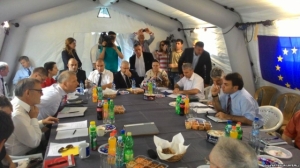Outcomes of an Emergency Meeting between Georgian Officials and De-facto Authorities
An emergency meeting under the Incident Prevention and Response Mechanism (IPRM) has come to a close in Ergneti between Georgian Interior Ministry officials and representatives of the de-facto authorities of South Ossetia. The sides held a discussion concerning the latest incidents that took place along the so-called “border” between Georgia and its breakaway region.
From three major issues of discussion, an agreement was reach on Vazha Tortladze, a 53 year-old local citizen of the village of Knolevi in Kareli district, who was kidnapped from his garden by Russian border guards close to the demarcation line with the breakaway region. He is expected to be returned home by tomorrow at the latest.
The South Ossetian side said it would leave the border signposts where the Russian guards have placed them marking the so-called “state border” deep inside the Georgian territory, which put local farmland and a section of the BP-operated pipeline under Russian control early this month, but promised that the local Georgian population, whose farmland now falls within the territory of South Ossetia, will be allowed to harvest. The locals, however, stay resentful, fearful of further incidents of kidnapping.
The meeting brought no agreement on a Georgian state flag, which the Russian troops took down. Interior Ministry officials expected the flag to be returned by the de-facto authorities. A representative of South Ossetia explained it is being used as evidence in Tskhinvali in an investigation they started following the latest incidents.
The situation on the administrative boundary line (ABL) of breakaway South Ossetia was first destabilized on July 10 when Russian-backed forces began illegally putting up markers on the territory adjacent to the village of Tsitelubani, Gori municipality, and the village of Orchosani, occupied Akhalgori district, also part of what is now described by Russian sources as South Ossetia, near Georgia’s main east-west highway.
Currently, access to the villages alongside the “border” remains restricted and only local residents are allowed to move in the area, a move which the Georgian police force initiated, in order to prevent further incidents, on July 17.
Ambassador Kęstutis Jankauskas, Head of European Union Monitoring Mission in Georgia (EUMM), who took part in the frames of the dialogue, after the meeting said the challenges which exist between the two sides could be overcome only through dialogue.
Another IPRM meeting is scheduled for July 30.
Nino Japarashvili
Photo: IPRM meeting on June 24, 2015












